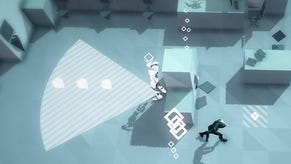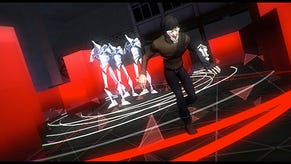Stealth Tactical Heisting: Mike Bithell's Volume
Up To Eleven
The maker of successful geometrical emotions simulator Thomas Was Alone, Mike Bithell, has revealed today that his next game will be Volume, a Metal Gear Solid-style stealth tactics game. The game is designed, coded and written by Mike and scored by David Housden. Based on burgling futuristic trinkets from behind the backs of tall intimidating AI types, the unnamed hero of Volume wants to steal to be heard. I spoke to Mike, a man seldom unheard, to try and prise the secrets of the game from him. Or, as I like to call it, an occlusion interview.
[REDACTED] does not kill. That would be far too easy. Instead, he commits his crimes through stealth. He sneaks, he distracts, he avoids. He is never seen, and seldom heard. As he grows in popularity and notoriety, so will his inventory. Blackjacks, bugles, thunderclaps and veils are just some of the tools at [REDACTED]'s disposal.
RPS [in booming voice]: So Mike, tell us about this [REDACTED] new game [until now 'codenamed' Project 2] you've been developing.
Mike: Well, it's the stealth game I've been developing since I was thirteen... that's not true, about fifteen. When I was meant to be doing my GCSEs. It's that kind of thing but kind of expanded upon. It's like that classic stealth but... I call it occlusion stealth but I'm not sure if that's... I think I made that up. Stealth but it's not about shadows, it's about hiding.
RPS: Hiding around corners. Corner stealth.
Mike: Yeah. It stopped being fashionable as much. I mean it exists but it's always been combined with the shadowy stuff. I really always liked that kind of stuff because it was always more kind of readable and you could understand what's going on.
RPS: Are other recent stealth games frustrating to you to play?
Mike: I've not been frustrated... I think the ambiguity of them makes you feel less clever. I have that experience, where you are playing a stealth game and you're not completely sure whether you can be seen or not, and that ambiguity doesn't play into the role-playing I want. When I'm playing a stealth game I don't want to be scared necessarily, I want to be... There's an element of that but I want to be 'I feel clever, and in control'. For me that comes from the information, that comes from being aware of what the situation is. There's some games that are doing it really well - I think the Batman games do it really well, I feel like a predator in that game - predator is the wrong word - I feel like I'm kind of in control of that situation. I'm owning that space. And it was the idea of doing that. Doing a stealth game where you felt like the clever person quickly solving the problem.
In the Sherlock Holmes movies, where he does that thing where he plans out a fight beforehand, and he does the whole description? That intellectual thinking applied to tactical decision making, making the player feel like they're doing that - it's always an illusion with games. You're not actually... I would be rubbish in a warzone. I wouldn't be very good as a military commander or as a sneaking... as a spy kind of person. But that kind of role play can happen if you make sure the player has that information. It's all about that: completely knowing what the current situation is, where everyone is, what's going on, and an interesting side effect of that is it allows you to play a lot faster. You're not sitting around waiting for twenty minutes for a guard to do his patrol path so you know where he's going.
RPS: Our industry's emphasis on graphics has pushed stealth games to go more into first person (or third person trailing camera) - our emphasis on that has often removed us from the top-down view. Is that something that you wanted to get back to?
Mike: Yeah I think so. I think you're right, as graphics have got better, we've wanted to put the camera closer to them. It's very interesting actually that a lot of recent games with stealth mechanics have kind of jerry-rigged that in afterwards, so in Dishonored you've got the see through walls thing, in The Last of Us as well. These mechanics have all kind of been recently readded. Because the problem is that the closer you go to a first person perspective, or even to just a tight over-the-shoulder third person perspective, you just cut out the field of view - the player doesn't know where all the enemies are. And especially if you're playing a game where it's about hiding behind walls, by nature of that process you're going to put a wall between you and the enemy which again lowers your awareness of them. So I wonder if that's actually fed into the reasons for going more into a 'hiding in the shadows' mechanic. So it works in Thief - Thief you have to hide in the shadows. In Thief you can't play it if it was a cover-based game, because the second they add cover in these kind of games they have to add a third person camera, like in the most recent Deus Ex, because you can't see what's going on. It's weird that you've immediately moved away from Metal Gear Solid style camera angles.
RPS: It's interesting that you chose to do a pure stealth mechanic. Stealth is often offered or tacked on these days as one of a 'choice' of ways to do things, and so stealth isn't always done well. [Part of me thinks this is the original Deus Ex's fault, because it was so successful that now everyone tries to do it.]
Mike: I think we do that too much - the whole choose your own way of playing - you can trace this back to obviously Metal Gear Solid 2 introduced that idea that you could finish the game without killing anyone, but obviously wasn't the first. That idea - that illusion of choice has become such a big deal - especially the way games are marketed. I saw - I forget what the tagline is for it - I saw a poster on the Underground for the new Splinter Cell game and it was something like 'play it your way'. What these games actually do is - they're not doing that - I mean Hitman is probably the closest it's come to truly adaptive, and when it is adaptive it's cool, but what they're actually doing is they're designing a stealth game and an action game and allowing the player to alternate between those two games. And when it works it works and it's cool, I'm not knocking it. But it can also mean that neither game kind of works perfectly in isolation and it means that the one game unbalances the other game.
With this one it's the idea of going pure stealth, there's no killing in the game. There's not even figurative - in the Batman sense - you can never permanently take anyone out of play. This is all being fiddled with and played with but at the moment you can knock someone out - but you can only knock them out for about three or four seconds. That's enough that you can get out of a tricky situation or you can get past someone. You can't take anyone out permanently. The AI for that reason kind of goes back to a slightly earlier kind of AI - so it is very much the 'Did you hear something? Must have been a breeze' or something like that. There is that in the game, but it kind of plays into it because you're moving so fast.
RPS: It sounds fast-paced.
Mike: I think it's definitely fast by stealth game standards. The environments take maybe a minute or two to get through tops, as a speedrun. The idea is that the players will be able to get through environments. The patience that's required in stealth games so often, you spend obviously so much of your time just sitting waiting, and I wanted to do as much as I could to minimise that. And that comes from communication to the player. Things like integrating the vision cones of the enemies into the game, so that all times you can see exactly what every enemy can see, exactly where their vision is, which leads to some really interesting bits - where you're hiding the wakes of bad guys, hiding in their blind spots.
It's very abstract, it's not realistic, I'm not going for realism, but it kind of means you can play the game in a much faster style. You feel safer; you know where things are, you know what's going on. And then obviously the other side of stealth games is when someone does see you, then it becomes a case of running away. AIs can set off alarms and bring their friends in, almost in a kind of Farcry 3 style, where there are alarms on the walls that they can use to notify other allies around the map to kind of look for you, stuff like that. It's all focused on this idea of making the player feel clever, making the player solve problems by being tactical, by being clever. Not by reaching for a gun. That different kind of hero, that intelligent kind of hero.
RPS: A lot of this sounds like Hotline Miami but specifically without the violence. With stealing instead.
Mike: I'm a big Hotline Miami fan. I'd be lying if I didn't say there was some influence there. What I liked about Hotline Miami is... the speed, the precision, just the sense that you never felt the game had got in your way, you'd always blame yourself: to me that's the perfect game control.
RPS: Let's talk more about the objectives of the game. Is there an overarching narrative there?
Mike: There is, I'm keeping it a secret for the time being. There is a big story thing: obviously I like writing, and that's something that people like about Thomas Was Alone, so I will be doing some stuff, and there is a big story and a big kind of... a cool cast and all this kind of stuff [he hints, seductively]. But I'm not talking about that. That's going to be revealed in October at Gamecity. There's going to be voiceacting, it's not going to be narrated.
RPS: And tell us more about the things that will help our hero along the way: Bugles, Blackjacks, all that?
Mike: Because you don't have a gun, obviously I needed something for the player to use in the environment, so you have a gadget called the Ricochet which is a tool that is attached to your left arm, and you can use it to basically fire projectiles, but there's no projectiles that just kill a bad guy, each projectile has different qualities that can be used to adjust and tactically play with the enemies.
They are largely focused on manipulating the way the AIs work: it's a lot like Hitman it's about breaking their patterns. So an enemy might be standing waiting, watching guard over an area, or they might be patrolling. It's about stepping into that situation and adjusting what they're doing for your benefit. So the two tools that are in there just now are the Blackjack and the Bugle.
The Blackjack is a direct projectile so you have to be able to see the enemy, you have to be able to have line of sight on the enemy, and then you can shoot a knockout at the enemy. It lasts exactly four seconds, and it just means they can't do anything for four seconds which gives you a moment. When they wake up they look for you or they might run for the alarm to alert guards they've been knocked out, so you obviously have to use it carefully, but it's a great way of getting out of a situation.
The other tool at the moment is the Bugle - and this is why the gadget's called the Ricochet, because the Bugle can bounce around. So you can actually launch this projectile and it flies off, bounces around off some walls and then makes a noise when it gets to where it's going, which can be a distraction to guards. That's probably my favourite, actually, because that one you actually can use really cleverly, and you can bounce it around the environment and convince enemies that you're somewhere you're not and obviously use that wake. And because it's not a direct attack, as in the Blackjack, it doesn't alert them, they're not going to set off an alarm - it's a great way of adjusting the enemy's pathfinding on the fly. "Just go over there for a minute, it's fine." And because it bounces off walls you can get it into very clever locations. It's almost like Breakout meets Metal Gear Solid.
RPS: Are there going to be cool things to steal?
Mike: At the moment in the trailer they're just kind of floating gemstones, but the idea is that yeah there will be a bunch of different objects to steal. What you have is in the bottom right is a meter which is how much you have stolen in terms of pound value, and essentially you have to hit a quota. Sometimes that quota is 100%, so you have to steal everything, sometimes that quota will be 50% and there'll be maybe one enormously expensive thing with lots of little smaller less expensive things. You decide which of those options you are going to go for, and where you're going to put your time. Once you've hit your quota the exit appears. Just a little bit of player choice: the player can decide, 'actually that's too difficult to get to, I'll go to the other one'. Or, 'I'll specifically get everything in this level because that'll make me look cool'.
RPS: Anything you are dying to tell us that's extra special about this game?
Mike: One massive one: player generated stuff. Any map in the game you can edit. The game will come with an editor for that. You can also make your own content. The idea is that essentially players will be able to remix everything. So if the game comes out, and someone thinks it's too easy, they can edit every level in the game, make them harder and then release their version. Obviously players will have to have the original game, but they can then download the super hard version someone's made and that becomes the prevailing version. Things like, let's say colour blindness: someone doesn't want the levels to have certain colours in them because that makes it difficult for them, they can go through or get someone else to go through and make those versions for the levels and release that. I really love the idea of games coming out and then having a kind of a legacy, kind of growing beyond what they were. And opening up your game to mods is great, but that means that only a very specific small portion of the player base can edit it. In Volume it's all integrated into the game itself which means anyone who can play Minecraft make a map for this game and that's a big deal to me. There's a little bit about that in the trailer.
RPS: Thank you for your time, Mike.
More info about the game will be released in October at Gamecity, including narrative surprises, and the game is due to 'arrive unexpectedly' sometime in 2014. The game will be playable first at Eurogamer Expo 2013. Mike is streaming the game tonight at 9pm UK time for the first time, and answering viewer questions. You can watch his twitter for more details on how to tune in.
Keep an eye on Volume development here.











